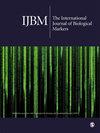Impact of EPclin on adjuvant therapeutic decision making and comparison of EPclin to the PREDICT tool.
IF 2.3
4区 医学
Q3 BIOTECHNOLOGY & APPLIED MICROBIOLOGY
International Journal of Biological Markers
Pub Date : 2021-06-01
Epub Date: 2021-05-22
DOI:10.1177/17246008211012424
引用次数: 1
Abstract
Purpose: Genomic signatures, such as EndoPredict®, may help clinicians to decide which adjuvant treatment is the most appropriate. Methods: We propose the EndoPredict® assay for unclear cases of adjuvant treatment in patients treated in our comprehensive cancer center. We prospectively and retrospectively report the decision of adjuvant treatment before and after the EndoPredict® assay, respectively, compared to the PREDICT’s tool scores. Results: From November 2016 to March 2019, 159 breast cancer tumors were analyzed and presented before and after the EndoPredict® assay. Before the EndoPredict® results, clinicians recommended chemotherapy for 57 patients (57/159, 36%). A total of 108 patients (108/159, 68%) were classified as EPclin high-risk score. There was only a slight agreement between clinicians’ decisions and EPclin risk score. The EPclin score led to 37% changes in treatment (59/159); chemotherapy was favored in 80% of cases (47/59). The PREDICT tool recommended chemotherapy for 16 high-risk patients (16/159, 10%). Conclusion: Although genomic tests were developed in order to de-escalate adjuvant treatment, in our comprehensive cancer center the use of the EndoPredict® assay led to an increase in prescribed chemotherapy.EPclin对辅助治疗决策的影响及与PREDICT工具的比较。
目的:基因组特征,如endopdict®,可以帮助临床医生决定哪种辅助治疗是最合适的。方法:我们建议在我们的综合癌症中心接受辅助治疗的不明确病例中使用endopdict®检测。我们前瞻性和回顾性地报告了endopdict®检测前后辅助治疗的决定,并与PREDICT的工具评分进行了比较。结果:2016年11月至2019年3月,我们分析了159例乳腺癌肿瘤,并在endopdict®检测前后进行了报告。在endoppredict®结果公布之前,临床医生推荐57名患者(57/159,36%)接受化疗。共有108例(108/159,68%)患者被归为EPclin高危评分。临床医生的决定与EPclin风险评分之间只有轻微的一致。EPclin评分导致37%的治疗变化(59/159);80%的病例(47/59)倾向于化疗。PREDICT工具推荐16例高危患者接受化疗(16/159,10%)。结论:虽然基因组检测是为了降低辅助治疗的级别而开发的,但在我们的综合癌症中心,endopdict®检测的使用导致了处方化疗的增加。
本文章由计算机程序翻译,如有差异,请以英文原文为准。
求助全文
约1分钟内获得全文
求助全文
来源期刊

International Journal of Biological Markers
医学-生物工程与应用微生物
CiteScore
4.10
自引率
0.00%
发文量
43
期刊介绍:
IJBM is an international, online only, peer-reviewed Journal, which publishes original research and critical reviews primarily focused on cancer biomarkers. IJBM targets advanced topics regarding the application of biomarkers in oncology and is dedicated to solid tumors in adult subjects. The clinical scenarios of interests are screening and early diagnosis of cancer, prognostic assessment, prediction of the response to and monitoring of treatment.
 求助内容:
求助内容: 应助结果提醒方式:
应助结果提醒方式:


